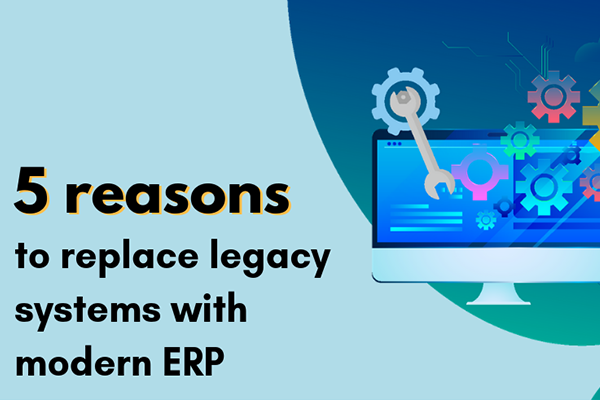5 Reasons To Replace Your Legacy System
Enterprise resource planning solutions are meant to help businesses process massive amounts of data for timely and accurate decisions. With the advancement in communications technology, the legacy ERP systems no longer fulfill the cause as they are not sufficiently powerful to meet the changing business demands. While a considerable amount of costs is involved in implementing a next-generation ERP, maintaining an old one is more likely to hurt the overall business revenue.
There are multiple reasons why companies need to replace their legacy systems with advanced ERP solutions. The major five of them are as follows.
Maintenance expenses
Legacy ERP systems are designed with features that can hardly support today's critical business challenges. In order to make these systems function properly, a lot of additional customization is required. This is time-consuming, and costs more money. Businesses that rely on upgrading legacy software, over a tenure, spend hefty amounts of money to support and carry out these customizations, not to say the disturbance the updates may cause in the overall workflow.
Modern ERP solutions have evolved to include features that can help organizations to have better control over business operations. These come with industry-ready templates that require minimal or no customization, which in turn, reduce hardware costs and make deploying a new ERP software a worthwhile and quicker endeavor compared to maintaining an outdated system.

Inability to integrate with other systems
One of the most impactful reasons to replace the legacy ERP software is their inability to integrate with other systems. Every business has multiple operations. When they are managed with the help of separate systems, fetching information from these unconnected programs become difficult. It also leads to data duplication or entry errors, which can reduce productivity and affect daily decisions making.
Modern ERP solutions are standalone systems which integrate multiple components that are expected to support all the operations of any company. These systems offer separate modules that deal with accounting, sales, human resource, customer relationship, production, distribution, quality control, and other functional departments. By having an integrated system to support business operations, organizations can experience faster delivery with fewer errors.
Restricted scalability and growth
As businesses expand, the requirements for managing information evolve. Legacy ERP systems are inflexible to these changes and do not have the potential to accommodate the growing amount of work required or adapt to other changing business needs.
The new ERP systems are agile in nature and have the capabilities to scale along with the business. These advanced ERP solutions help companies to support their new initiatives and challenges in order to stay ahead of the competition.
Lack of visibility to vital information
One of the biggest challenges posed by legacy ERP systems to business owners is the inability to access and analyze business information fast, which often impairs decision making. These systems’ functionality is also limited to location and so important information can only be accessed from devices that are within the office premises. As a result, decision making suffers in absence of systems that can find and leverage important business information as and when required.
The next generation ERP software solutions are designed to enable businesses to store data generated through various functions into the same application. This information is widely accessible through user-defined access, which helps the management gain greater visibility to real-time business data, vital for more precise decision-making.
Incompetent to regulatory mandates
Companies need to function in compliance with various regulations on several levels. One of the major purposes for companies to replace their legacy systems with advanced solutions is to keep their businesses up-to-date with the current regulatory mandates. For example, an organization dealing with monitory transactions needs a system that can automatically calculate sale tax and add to the bill. If this need is done manually, it takes a lot of time and more often is prone to human errors, which leads to loss of money and in the worst case even damage the brand value. To ensure regulatory compliances are properly addressed, your business needs to have an ERP system that can support them.
With the evolving business landscape, the best time to start looking and implement a new ERP solution is right now.
Focus Softnet has some of the best cloud ERP software solutions equipped with advanced features that can help you improve the operational efficiency of your company and drive growth.
Why not get in touch with us for a free demo or consultation to have a better understanding of our products and their utility. Reach us today!








